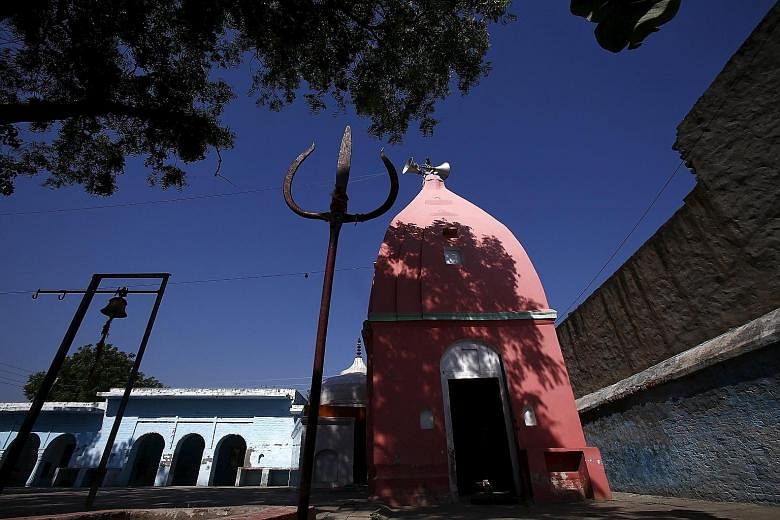BISADA (India) • The vigilantes from Save the Cow sprang into action the moment they heard a rumour that a cow's slaughtered remains had been found near an electrical transformer looming over the heart of this village. They quickly raised the alarm through text messages and phone calls. A local Hindu priest was asked to alert villagers from his temple loudspeaker.
Soon, about 1,000 men had gathered by the transformer. There was no sign that a cow, a holy symbol for Hindus, had been slaughtered. Nonetheless, the men proceeded through zig-zagging alleys to the home of the alleged cow killer, Mr Mohammed Ikhlaq, one of the few Muslims living in this village about 48km east of New Delhi.
Mr Ikhlaq and his wife Ikraman were upstairs taking a nap after dinner and prayers. Suddenly, their home was swarming with men. Mrs Ikhlaq heard someone shout: "Kill them."
She, her husband and their son Danish, 20, retreated inside, behind a thick wooden door. The mob shattered the door. "What's the matter?" Mrs Ikhlaq cried out. A voice replied from the crowd: "After slaughtering a cow, you are asking us what is the matter?"
Men began to paw at Mrs Ikhlaq, so she bit hard into a sweaty hand, broke free and fled downstairs, "too scared to even breathe", she said in an interview.
Upstairs, the mob bludgeoned her husband with her sewing machine and smashed her son's head with a brick. They then dragged Mr Ikhlaq down 14 steps and out to the main road by the transformer, where he was left for all to see.
Mr Ikhlaq was declared dead early last Tuesday morning, hours after the attack; his son remains in critical condition. But in interviews last week, more than a half dozen members of Save the Cow expressed little remorse for what happened at the Ikhlaqs' home.
Instead, they blamed Mr Ikhlaq for inciting the mob's fury by slaughtering and eating a cow - an allegation dismissed by the Ikhlaq family and police, who have filed murder charges against 10 men.
"It was not our intention to kill him," said Mr Vichitra Kumar Tomar, a leader of Save the Cow who was not among those charged. "Our intention was to punish him, to slap him or beat him. Just a few slaps. But not to leave him dead."
Members of Save the Cow said they were motivated to raise the alarm on Sept 28 because of their religious devotion. "We are more attached to the cow than our own children," Mr Inder Nagar said.
Beef consumption has long been a subject of controversy in Hindu-majority India. It is not hard to find graffiti in rural villages calling for those who slaughter cows to be hanged.
There is also a powerful political motivation behind their activism.
Many leaders of Save the Cow here are also prominent local organisers in Prime Minister Narendra Modi's Hindu nationalist Bharatiya Janata Party (BJP), which is vying to oust the socialist party that leads Uttar Pradesh, a vast northern state with more than 200 million residents, including the 20,000 in this village.
Mr Tomar, 24, for example, is the general secretary of the local BJP youth wing. Mr Nagar, 33, is the state secretary of the BJP youth wing. According to The Times of India, one of the 10 men arrested is the son of a local BJP leader.
Save the Cow and BJP leaders here have condemned the police decision to bring murder charges. In their view, the death of Mr Ikhlaq was at most the unintended by-product of a chaotic, highly charged situation of his own making.
Mr Modi's Culture Minister, Mr Mahesh Sharma, who represents this area in Parliament, went so far as to tell The Indian Express that Mr Ikhlaq's death "should be considered as an accident".
As of Sunday morning, Mr Modi had yet to make any public comment about the attack on the Ikhlaq family - an uncharacteristic silence for a leader who makes frequent use of Twitter. Indeed, prominent Muslim leader Asaduddin Owaisi pointed out that Mr Modi took time last week to send condolences on Twitter to a celebrated Indian singer on the death of her son.
Other vigilante groups have cropped up in this region. A video surfaced in June showing Hindu men in another Uttar Pradesh village beating a Muslim man they accused of being a "cow murderer" and warning that the same fate awaited anyone caught killing cows.
"We have to tackle this problem our way, among ourselves," Mr Tomar said. In the meantime, the group is focused on lending moral and political support to the 10 men who have been accused of murder. "They are totally innocent," Mr Tomar said.
NEW YORK TIMES

